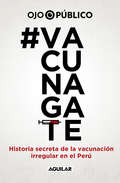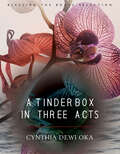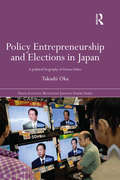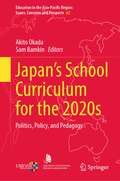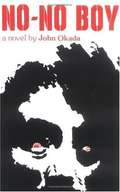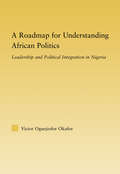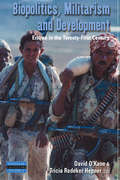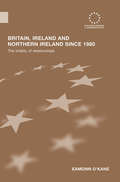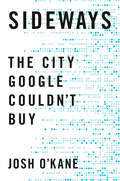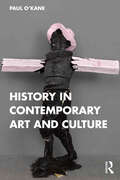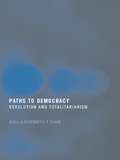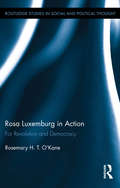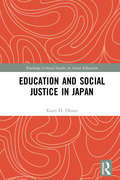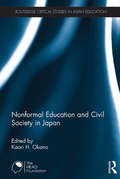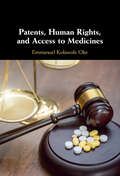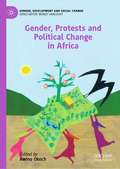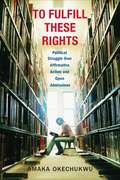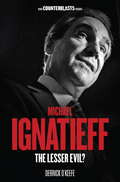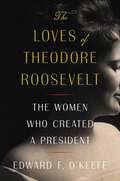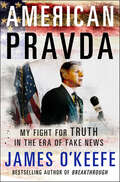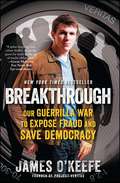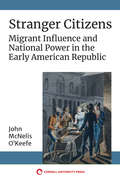- Table View
- List View
#Vacunagate: Historia secreta de la vacunación irregular en el Perú
by OjoPúblicoEl libro que revela la compleja telaraña de influencias, intereses y privilegios en el proceso de vacunación peruano Pocos escándalos públicos de la historia reciente en el Perú han expuesto los hilos del poder con tanta rapidez e impacto como el caso de las vacunas contra la COVID-19, aplicadas en secreto a medio centenar de privilegiados, entre los que se encuentra el expresidente Martín Vizcarra. El equipo periodístico de OjoPúblico ha realizado un exhaustivo trabajo de investigación sobre estas prácticas irregulares, de donde se desprenden varias interrogantes: ¿Cómo fue que un grupo de médicos pudo aplicar las candidatas a vacunas violando principios bioéticos, con la autorización de las autoridades sanitarias del país y vulnerando protocolos esenciales de lo que debía ser un hito en la historia médica peruana? ¿Por qué una pandemia se convierte en un asunto de geopolítica? ¿Cuántas muertes justifican el oportunismo político? #Vacunagate examina el entramado de ciencia, diplomacia, intereses empresariales, vínculos políticos, componendas entre el sector público y privado, y otros factores que explican lo que podría ser una de las mayores muestras de abuso de poder en medio de la pandemia.
A Tinderbox in Three Acts (American Poets Continuum Series #195)
by Cynthia Dewi OkaSelected by Aracelis Girmay, A Tinderbox in Three Acts is at once elegy and exegesis, fact and invention. In her fourth poetry collection, Cynthia Dewi Oka performs a lyric accounting of the anti-Communist genocide of 1965, which, led by the Indonesian military and with American assistance, erased and devastated millions of lives in Indonesia. Under the New Order dictatorship that ruled by terror for over three decades in the aftermath, perpetrators of the killings were celebrated as national heroes while survivors were systemically silenced. Drawing on US state documents that were only declassified in recent years, Oka gives form and voice to the ghosts that continue to haunt subsequent generations despite decades of state-produced amnesia and disinformation.In service of recovering what must not be remembered, A Tinderbox in Three Acts repurposes the sanitized lexicon of official discourse, imagines an emotional syntax for the unthinkable, and employs synesthetic modes of perception to convey that which exceeds language. Here, the boundary between singular and collective consciousness is blurred. Here, history as an artifact of the powerful is trumped by the halting memory of the people whom power sought to destroy. Where memory fails, here is poetry to honor the dishonored, the betrayed, the lost and still-awaited.
Policy Entrepreneurship and Elections in Japan: A Political Biogaphy of Ozawa Ichirō (Nissan Institute/Routledge Japanese Studies)
by Takashi OkaOzawa Ichirō is one of the most important figures in Japanese politics, having held the positions of Chief Secretary of the Liberal Democrat Party and, after defection from the LDP, President of the Democratic Party of Japan. Ozawa has distinctive ideas that set him apart from the average Japanese politician, he believes in the concept of the independence of the individual, as opposed to the importance of the group, and as a policy entrepreneur he has had a huge impact on political change not only advocating but precipitating institutional change in a key political area – the election system. Using extensive interview data from key players in the political arena, this book examines Ozawa's struggle to normalize alternation in office between two competingpolitical parties – particularly significant given the results of the 2009 election which handed over power to the Democratic Party of Japan – and how he has used his entrepreneurial talents to precipitate and carry out institutional change. Not only a political biography, but also an in-depth analysis of the Japanese political and electoral systems, this book will be of huge interest to anyone interested in Japanese politics and electoral systems.
Japan’s School Curriculum for the 2020s: Politics, Policy, and Pedagogy (Education in the Asia-Pacific Region: Issues, Concerns and Prospects #67)
by Akito Okada Sam BamkinJapan’s school curriculum, revised for the 2020s, introduces new subjects and, perhaps more importantly, a new vision for teaching referred to as 'active learning'. This book examines the social and political realities that provided space for this unprecedented curriculum reform; the policymaking process through which it was refined; its envisaged pedagogy, and the intended and unintended outcomes of the new requirements, both on the ground in each school subject and across the education system. Finally, the book steps back to consider the possible future of ‘active learning’ and direction of the course of study in this decade and the next. This book will be of interest to those researching contemporary Japanese education, education policy, curriculum studies and equality of educational opportunity.
No-No Boy
by John OkadaA Japanese-American struggles with his identity and decisions during World War II
A Roadmap for Understanding African Politics: Leadership and Political Integration in Nigeria (African Studies)
by Victor Oguejiofor OkaforThis book examines the impact of post-colonial leadership on political integration in Nigeria, offering an in-depth understanding of the historical and contemporary forces that shape Nigeria's national politics as well as African politics generally. Okafor discusses how Nigeria's pre-colonial and colonial political histories along with contemporary external forces like neo-colonialism, as well as internal social, economic and political structures and developments, have affected emerging post-independence politics in the country. The study climaxes with an Africa-centered theory of political and integrative leadership and then uses it as a prism for analyzing six Nigerian post-independence political leaderships, encompassing Nigeria's First and Second Republics, along with their military interregna. The concluding chapter includes a discussion of the implications of the study for leadership and political integration in Africa in general.
The Logic of Conformity
by Tomoko T. OkagakiIn The Logic of Conformity, Tomoko T. Okagaki examines Japan's entry into the European state system in the late nineteenth century. Okagaki focuses on the extraordinary degree of conformity that Japan demonstrated in accommodating itself to Western norms of international relations within a very short period of time. By introducing a political science perspective to the study of Japan's modernization, which has heretofore been studied mostly as a historical subject, she emphasizes the significance of contextual factors that constrained the ways in which Japan entered international society.As Okagaki shows, while the international system defined the mode of Japan's socialization in many ways, Japan's entry also symbolized a transformation of the international system from that of Euro-dominance to legal equality. A sophisticated and significant contribution to the literature on state building and the history of international relations, The Logic of Conformity is a fascinating study of how the concept of sovereignty is reshaped by the entrance of newcomers.
Biopolitics, Militarism, and Development: Eritrea in the Twenty-First Century (Dislocations #6)
by David O'Kane Tricia Redeker HepnerBringing together original, contemporary ethnographic research on the Northeast African state of Eritrea, this book shows how biopolitics - the state-led deployment of disciplinary technologies on individuals and population groups - is assuming particular forms in the twenty-first century. Once hailed as the “African country that works,” Eritrea’s apparently successful post-independence development has since lapsed into economic crisis and severe human rights violations. This is due not only to the border war with Ethiopia that began in 1998, but is also the result of discernible tendencies in the “high modernist” style of social mobilization for development first adopted by the Eritrean government during the liberation struggle (1961–1991) and later carried into the post-independence era. The contributions to this volume reveal and interpret the links between development and developmentalist ideologies, intensifying militarism, and the controlling and disciplining of human lives and bodies by state institutions, policies, and discourses. Also assessed are the multiple consequences of these policies for the Eritrean people and the ways in which such policies are resisted or subverted. This insightful, comparative volume places the Eritrean case in a broader global and transnational context.
Britain, Ireland and Northern Ireland since 1980: The Totality of Relationships (Routledge Advances in European Politics)
by Eamonn O'KaneThis book is the first in-depth analysis of the interaction between the British and Irish governments and the role they have played in seeking to resolve the conflict in Northern Ireland since 1980. Eamonn O’Kane examines Britain and Ireland’s objectives in relation to the Northern Ireland conflict, focusing on the influential factors that persuaded these two governments to co-operate at a closer level and those which made this co-operation difficult to achieve and at times sustain. Drawing on extensive primary research, including interviews with leading British and Irish politicians and civil servants, the book questions many of the most widely accepted arguments regarding the conflict. It sheds new light upon the objectives of the two states in Northern Ireland, the origins of the peace process, the reasons that the conflict appeared so intractable and the role of the international dimension. The book places events in context and offers a more convincing explanation for many of the advances and disappointments in Northern Ireland in recent years than is currently available. This volume offers a reinterpretation of the intergovernmental approach to the Northern Ireland conflict and peace process and is an invaluable resource for students and researchers of British politics, Irish studies and conflict studies.
Sideways: The City Google Couldn't Buy
by Josh O'KaneFrom the Globe and Mail tech reporter who revealed countless controversies while following the Sidewalk Labs fiasco in Toronto, an uncompromising investigation into the bigger story and what the Google sister company's failure there reveals about Big Tech, data privacy and the monetization of everything.When former New York deputy mayor Dan Doctoroff landed in Toronto, promising a revolution in better living through technology, the locals were starstruck. In 2017 a small parcel of land on the city's woefully underdeveloped lakeshore was available for development, and with Google co-founder Larry Page and his trusted chairman Eric Schmidt leaning into Sidewalk Labs' pitch for the long-forsaken property—with Doctoroff as the urban-planning company's CEO—Sidewalk's bid crushed the competition. But as soon as the bid was won, cracks appeared in the partnership between Doctoroff's team and Waterfront Toronto, the government-sponsored organization behind the contest. There were hundreds more acres of undeveloped former port lands nearby that kept creeping into conversation with Sidewalk, and more questions were emerging than answers about how much the public would actually benefit from the Alphabet-owned company's vision for the high-tech neighbourhood—and the data it could harvest from the people living there. Alarm bells began ringing in the city's corridors of power and activism. To Torontonians accustomed to big promises with little follow-through, the fiasco that unfolded seemed at first like just another city-building sideshow. But the pained battle to reel in the power of Sidewalk Labs became a crucible moment in the worldwide battle for privacy rights and against the extension of Big Tech&’s digital might into the physical world around us. With extensive contacts on all sides of the debacle, O'Kane tells a story of global consequence fought over a small, forgotten parcel of mud and pavement, taking readers from California to New York to Toronto to Berlin and back again. In the tradition of extraordinary boardroom dramas like Bad Blood and Super Pumped, Sideways vividly recreates the corporate drama and epic personalities in this David-and-Goliath battle that signalled to the world that all may not be lost in the effort to contain the rapidly growing power of Big Tech.
History in Contemporary Art and Culture
by Paul O'KaneThis unique book offers guidance for contemporary art practices in dialogue with history, story, memory, and tradition. Artist and lecturer Paul O’Kane uses innovative and creative means, informed by a storytelling tradition as well as academic research, to make connections between contemporary art, history, and the past. The aim of this book is to give readers a sense of the profundity of historical questions, while making the challenge inviting, welcoming and manageable. It is designed to set out an expansive, inclusive and diverse range of potential directions, and speculations from which students can develop personal paths of enquiry. This is achieved by writing and designing the text in an accessible way and providing a range of ‘ways-in’. A series of carefully chosen references, examples, key texts, and possible essay questions are chosen and pitched at various levels and can be close-read, discussed, digested, and responded to either verbally or in the form of a presentation or essay. Written primarily for a broad range of fine arts students, this book encourages readers to reconsider their studies and art practices in light of a historical perspective, enhanced by creative contributions from artists, imaginative philosophers, and influential cultural commentators.
Paths to Democracy: Revolution and Totalitarianism
by Rosemary H. O'KaneHow and why countries become democracies remain intriguing questions. This innovative volume provides a theoretically informed comparative investigation of the links between revolutions, totalitarianism and democracy. It will appeal to those interested in the relationship between history and democracy and the implications for the understanding of democracy today.
Rosa Luxemburg in Action: For Revolution and Democracy (Routledge Studies in Social and Political Thought #97)
by Rosemary H. O'KaneNeither a work concerned only with her Marxist writings nor a personal biography concerned with her private life, this book examines Rosa Luxemburg’s ideas on revolution and democracy and how the two are bound together by her views on the importance of political action. Stretching, historically, from 1863 to the present, this book covers in great detail the history and developments within the German SPD during her time, the 1905 and 1917 Russian Revolutions, the German Revolution, the outbreak of World War I and the imperialism that fuelled it. It then moves on to consider political and historical developments after her death and examines her arguments on revolution and democracy in the light of the post-revolutionary government in Nicaragua: the one violent revolution that sought to establish social democracy (but failed). Also covered are aspects of Rosa Luxemburg’s life, her important writings and actions, the relevant Marxist debates in which she was involved, including, for example Bernstein’s arguments on social democracy through reform and, with Lenin, on revolutionary organization. A welcomed and timely collection presenting an important examination of the political and social context in which Luxemburg developed her activities and views and a complete understanding of the history of social democracy, the revolutionary times of a century ago and the relevance of their events and ideas for more recent revolutions for democracy in the twenty-first century.
Education and Social Justice in Japan (Routledge Critical Studies in Asian Education)
by Kaori H. OkanoThis book is an up-to-date critical examination of schooling in Japan by an expert in this field. It focuses on developments in the last two decades, with a particular interest in social justice. Japan has experienced slow economic growth, changed employment practices, population decline, an aging society, and an increasingly multi-ethnic population resulting from migration. It has faced a call to respond to the rhetoric of globalization and to concerns in childhood poverty in the perceived affluence. In education we have seen developments responding to these challenges in national and local educational policies, as well as in school-level practices. What are the most significant developments in schooling of the last two decades? Why have these developments emerged, and how will they affect youth and society as a whole? How can we best interpret social justice implications of these developments in terms of both distributive justice and the politics of difference? To what extent have the shifts advanced the interests of disadvantaged groups? This book shows that, compared to three decades ago, the system of education increasingly acknowledges the need to address student diversity of all kinds, and delivers options that are more varied and flexible. But interest in social justice in education has tended to centre on the distribution of education (who gets how much of schooling), with fewer questions raised about the content of schooling that continues to advantage the already advantaged. Written in a highly accessible style, and aimed at scholars and students in the fields of comparative education, sociology of education and Japanese studies, this book illuminates changing policies and cumulative adjustments in the daily practice of schooling, as well as how various groups in society make sense of these changes.
Nonformal Education and Civil Society in Japan (Routledge Critical Studies in Asian Education)
by Kaori H. OkanoNonformal Education and Civil Society in Japan critically examines an aspect of education that has received little attention to date: intentional teaching and learning activities that occur outside formal schooling. <P><P>In the last two decades nonformal education has rapidly increased in extent and significance. This is because individual needs for education have become so diverse and rapidly changing that formal education alone is unable to satisfy them. Increasingly diverse demands on education resulted from a combination of transnational migration, heightened human rights awareness, the aging population, and competition in the globalised labour market. Some in the private sector saw this situation as a business opportunity. Others in the civil society volunteered to assist the vulnerable. The rise in nonformal education has also been facilitated by national policy developments since the 1990s. <P><P>Drawing on case studies, this book illuminates a diverse range of nonformal education activities; and suggests that the nature of the relationship between nonformal education and mainstream schooling has changed. Not only have the two sectors become more interdependent, but the formal education sector increasingly acknowledges nonformal education’s important and necessary roles. These changes signal a significant departure from the past in the overall functioning of Japanese education. The case studies include: neighbourhood homework clubs for migrant children, community-based literacy classes, after-school care programs, sport clubs, alternative schools for long-term absent students, schools for foreigners, training in intercultural competence at universities and corporations, kôminkan (community halls), and lifelong learning for the seniors. This book will appeal to both scholars of Japanese Studies/Asian Studies, and those of comparative education and sociology/anthropology of education.
Patents, Human Rights, and Access to Medicines
by Emmanuel Kolawole OkePatent rights on pharmaceutical products are one of the factors responsible for the lack of access to affordable medicines in developing countries. In this work, Emmanuel Kolawole Oke provides a systematic analysis of the tension between patent rights and human rights law, contending that, in order to preserve their patent policy space and secure access to affordable medicines for their citizens, developing countries should incorporate a model of human rights into the design, implementation, interpretation, and enforcement of their national patent laws. Through a comprehensive analysis of court decisions from three key developing countries (India, Kenya, and South Africa), Oke assesses the effectiveness of national courts in resolving conflicts between patent rights and the right to health, and demonstrates how a model of human rights can be incorporated into the adjudication of patent rights.
Gender, Protests and Political Change in Africa (Gender, Development and Social Change)
by Awino OkechThis book brings together conceptual debates on the impact of youth-hood and gender on state building in Africa. It offers contemporary and interdisciplinary analyses on the role of protests as an alternative route for citizens to challenge the ballot box as the only legitimate means of ensuring freedom. Drawing on case studies from seven African countries, the contributors focus on specific political moments in their respective countries to offer insights into how the state/society social contract is contested through informal channels, and how political power functions to counteract citizen’s voices. These contributions offer a different way of thinking about state-building and structural change that goes beyond the system-based approaches that dominate scholarship on democratization and political structures. In effect, it provides a basis for organizers and social movements to consider how to build solidarity beyond influencing government institutions.
To Fulfill These Rights: Political Struggle Over Affirmative Action and Open Admissions
by Amaka OkechukwuIn 2014 and 2015, students at dozens of colleges and universities held protests demanding increased representation of Black and Latino students and calling for a campus climate that was less hostile to students of color. Their activism recalled an earlier era: in the 1960s and 1970s, widespread campus protest by Black and Latino students contributed to the development of affirmative action and open admissions policies. Yet in the decades since, affirmative action has become a magnet for conservative backlash and in many cases has been completely dismantled.In To Fulfill These Rights, Amaka Okechukwu offers a historically informed sociological account of the struggles over affirmative action and open admissions in higher education. Through case studies of policy retrenchment at public universities, she documents the protracted—but not always successful—rollback of inclusive policies in the context of shifting race and class politics. Okechukwu explores how conservative political actors, liberal administrators and legislators, and radical students have defined, challenged, and transformed the racial logics of colorblindness and diversity through political struggle. She highlights the voices and actions of the students fighting policy shifts in on-the-ground accounts of mobilization and activism, alongside incisive scrutiny of conservative tactics and messaging. To Fulfill These Rights provides a new analysis of the politics of higher education, centering the changing understandings and practices of race and class in the United States. It is timely and important reading at a moment when a right-wing Department of Justice and Supreme Court threaten the end of affirmative action.
Tenants of the House
by Wale OkediranTenants of the House is a skillful depiction of the ugly underbelly of Nigerian politics unveiling the intrigues, chicanery, and greed pervasive within the country s political and legislative processes. The book is a fictionalized account of the author s experiences while serving in the country s House of Representatives. It portrays with gripping suspense a nation in dire need of moral rejuvenation.
Michael Ignatieff
by Derrick O'KeefeOne of the most influential intellectuals in the English-speaking world, Michael Ignatieff's story is generally understood to be that of an ambitious, accomplished progressive politician and writer, whose work and thought fit within an enlightened political tradition valuing human rights and diversity. Here, journalist Derrick O'Keefe argues otherwise. In this scrupulous assessment of Ignatieff's life and politics, he reveals that Ignatieff's human rights discourse has served to mask his identification with political and economic elites.Tracing the course of his career over the last thirty years, from his involvement with the battles between Thatcher and the coal miners in the 1980s to the Balkan Wars of the 1990s, Iraq, Afghanistan, and Israel's 2009 invasion of Gaza, O'Keefe proposes that Ignatieff and his political tradition have in fact stood in opposition to the extension of democracy and the pursuit of economic equality. Michael Ignatieff: The Lesser Evil? is a timely assessment of the Ignatieff phenomenon, and of what it tells us about the politics of the English-speaking West today.From the Trade Paperback edition.
The Loves of Theodore Roosevelt: The Women Who Created a President
by Edward F. O'KeefeA spirited and poignant family love story, revealing how an icon of rugged American masculinity was profoundly shaped by the women in his life, especially his mother, sisters, and wives.Theodore Roosevelt wrote in his senior thesis for Harvard in 1880 that women ought to be paid equal to men and have the option of keeping their maiden names upon marriage. It&’s little surprise he&’d be a feminist, given the women he grew up with. His mother, Mittie, was witty and decisive, a Southern belle raising four young children in New York while her husband spent long stretches away with the Union Army. Theodore&’s college sweetheart and first wife, Alice—so vivacious she was known as Sunshine—steered her beau away from science (he&’d roam campus with taxidermy specimen in his pockets) and towards politics. Older sister Bamie would soon become her brother&’s key political strategist and advisor; journalists called her Washington, DC, home &“the little White House.&” Younger sister Conie served as her brother&’s press secretary before the role existed, slipping stories of his heroics in Cuba and his rambunctious home life to reporters to create the legend of the Rough Rider we remember today. And Edith—Theodore&’s childhood playmate and second wife—would elevate the role of presidential spouse to an American institution, curating both the White House and her husband&’s legacy. A dazzling and lyrical look at one America&’s most significant presidents as we&’ve never seen him before, The Loves of Theodore Roosevelt celebrates five extraordinary yet unsung women who opened the door to the American Century and pushed Theodore Roosevelt through it.
American Pravda: My Fight for Truth in the Era of Fake News
by James O'KeefeThe one real difference between the American press and the Soviet state newspaper Pravda was that the Russian people knew they were being lied to. To expose the lies our media tell us today, controversial journalist James O’Keefe created Project Veritas, an independent news organization whose reporters go where traditional journalists dare not. Their investigative work–equal parts James Bond, Mike Wallace, and Saul Alinsky—has had a consistent and powerful impact on its targets.In American Pravda, the reader is invited to go undercover with these intrepid journalists as they infiltrate political campaigns, unmask dishonest officials and expose voter fraud. A rollicking adventure story on one level, the book also serves as a treatise on modern media, arguing that establishment journalists have a vested interest in keeping the powerful comfortable and the people misinformed.The book not only contests the false narratives frequently put forth by corporate media, it documents the consequences of telling the truth in a world that does not necessarily want to hear it. O’Keefe’s enemies attack with lawsuits, smear campaigns, political prosecutions, and false charges in an effort to shut down Project Veritas. For O’Keefe, every one of these attacks is a sign of success.American Pravda puts the myths and misconceptions surrounding O’Keefe’s activities to rest and will make you rethink every word you hear and read in the so-called mainstream press.
Breakthrough: Our Guerilla War to Expose Fraud and Save Democracy
by James O'KeefeIn this New York Times bestseller, controversial ambush journalist James O'Keefe takes a hard-hitting look at how the media and government conspire to protect the status quo: "A spine-tingling, true crime thriller about the quest for truth in the age of media obfuscation" (Gavin McInnes, FOX News contributor).Hailed by David Weigel in Slate as having "had more of an impact on the 2012 election than any journalist," James O'Keefe is young, brash, and provocative: a new breed of guerrilla reporter for the twenty-first century. He and his associates have famously infiltrated some of America's most protected organizations and institutions. Now, in Breakthrough, O'Keefe chronicles the harrowing undercover investigation that opened America's eyes to the chicanery of its state houses and the duplicity of the White House during one of the most compromised election campaigns in our nation's history: the 2012 presidential race. Of all his controversial sting operations, this was the one that his late mentor, Andrew Breitbart, called "his most consequential." While still on federal probation, O'Keefe organized an army of citizen journalists, planned a series of video stings to reveal the American system's vulnerability to voter fraud, and went nose to nose with the most powerful political machine in the world. Along the way, O'Keefe found disheartening evidence that Americans are not nearly as free as we may believe, but also showed just how much real change ordinary citizens can bring about when they are willing to risk the wrath of the powerful. Free of ideology, Breakthrough is at its core a clarion call for a more ethical society. Despite being vilified and libeled by an establishment media dedicated to suppressing the truth, James O'Keefe has dared to break through the firewall and reshape public opinion by showing things as they really are.
Breakthrough
by James O'KeefeIn this hard-hitting look at the way media and government conspire to protect the status quo, controversial ambush journalist James O'Keefe shows the reader what happens when a young citizen journalist challenges some of America's most powerful and protected organizations.James O'Keefe has been on the front lines of journalism since his student days at Rutgers. In Breakthrough, he takes the reader through his effrts to expose the duplicity of Planned Parenthood, ACORN, Medicaid, NPR, the New Jersey Educational Association, labor unions and politicians. He shows how the major media slandered him at almost every turn, how state officials harassed him, and how federal officials arrested him and his colleagues on contrived charges in New Orleans. While still on federal probation, legal necessity forced O'Keefe to train an army of citizen journalists to take on what mentor Andrew Breitbart called his "most consequential" investigation to date: a series of video stings that revealed the total vulnerability of American elections to vote fraud. O'Keefe tells the story of his team's harrowing adventures, as O'Keefe learns that we are not nearly as free a people as we think we are. Breakthrough shows the opportunity that still exists for independent journalists to break through the media firewall, reshape public opinion, and inspire political reform.
Stranger Citizens: Migrant Influence and National Power in the Early American Republic
by John McNelis O'KeefeStranger Citizens examines how foreign migrants who resided in the United States gave shape to citizenship in the decades after American independence in 1783. During this formative time, lawmakers attempted to shape citizenship and the place of immigrants in the new nation, while granting the national government new powers such as deportation. John McNelis O'Keefe argues that despite the challenges of public and official hostility that they faced in the late 1700s and early 1800s, migrant groups worked through lobbying, engagement with government officials, and public protest to create forms of citizenship that worked for them. This push was made not only by white men immigrating from Europe; immigrants of color were able to secure footholds of rights and citizenship, while migrant women asserted legal independence, challenging traditional notions of women's subordination.Stranger Citizens emphasizes the making of citizenship from the perspectives of migrants themselves, and demonstrates the rich varieties and understandings of citizenship and personhood exercised by foreign migrants and refugees. O'Keefe boldly reverses the top-down model wherein citizenship was constructed only by political leaders and the courts.Thanks to generous funding from the Sustainable History Monograph Pilot and the Mellon Foundation the ebook editions of this book are available as Open Access (OA) volumes from Cornell Open (cornellopen.org) and other Open Access repositories.
